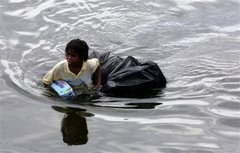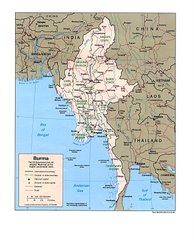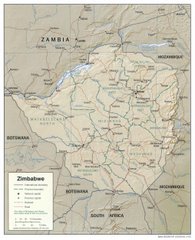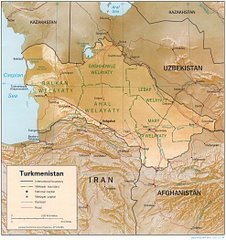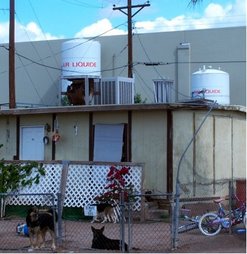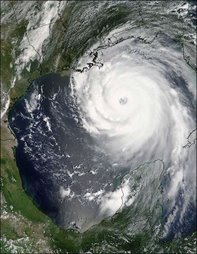This week we move to Part 1 of a two-part series on disasters. Our Fourth Concern considers the often forgotten victims of natural disasters: non-human animals. We may recall the remarkable stories of wild animals escaping the Indian Ocean tsunami in 2004. Domestic animals, however, are rarely as fortunate. Which is why Our Fourth Concern highlights Animals in Disasters, and offers ways you can help prevent future catastrophes for both people and pets.
Learn More About...
- The PETS Act, which offers federal disaster relief funding only to those states that include pets in their disaster response plans, was signed by President Bush in 2006. According to a recent Zogby poll, 61% of Americans say they won't leave their homes without their pets during a disaster. Approximately 600,000 animals were abandoned during Hurricane Katrina.
- Several charities that have dedicated national, and in some cases international, disaster relief response programs for animals:
- The International Fund for Animal Welfare (IFAW)
- American Humane Association (AHA)
- The Humane Society of the United States (HSUS)
- The difficulties associated with disaster relief for animals:
- A report on developing a county-wide plan in North Carolina
- Efforts by vet students at Louisiana State University to launch a spay/neuter program
Take Action by...
- Taking the Disaster Preparedness Quiz
- Taking a few moments to help pets abandoned by Hurricane Katrina
Have an idea or comment about Animals in Disasters? Post them below.
Sunday, January 28, 2007
Wednesday, January 24, 2007
Update: Cluster bombs and more
Thanks to a great comment by a reader, I'm posting some links to more information about cluster bombs, which pose as equally a significant threat to civilians as do landmines. I've also included a link to one of the most action-oriented organizations dedicated to landmine removal.
- The Mine Action Information Center at James Madison University: a thorough resource that not only provides the latest news on landmine and cluster bomb threats around the world, but also publishes The Journal of Mine Action, which offers the latest developments in the field.
- Here's a fascinating but disturbing report from the U.N. on the slow de-mining process in Lebanon where over 1 million cluster bombs remain from the Israeli-Lebanese war in July 2006. Even the technology that detects and removes these weapons can be costly and tricky. About 1,200 Lebanese and 157 Israelis were killed during the Israeli-Lebanese conflict.
- Adopt-A-Minefield: a great resource for those who want to take action on the landmine issue. Adults can host a fundraising dinner with some friends and students can organize simple fundraising events on campus. Perhaps the easiest action to take is to Donate as your budget allows or to actually Adopt-A-Minefield in your name.
- Finally, Adopt-A-Minefield offers one of the best factsheets I've seen on the issue, reporting that 35-40 million landmines remain in 82 countries and that 90% of all landmine victims are civilians. About 30% of all victims are children, or 8,000 - 10,000 children annually. While progress has been made in some countries, much more work remains in others.
As always, thanks for taking action on this issue and for posting your comments. Thanks for speaking out and spreading the word about this blog. And thanks for sharing Our Common Concern.
- The Mine Action Information Center at James Madison University: a thorough resource that not only provides the latest news on landmine and cluster bomb threats around the world, but also publishes The Journal of Mine Action, which offers the latest developments in the field.
- Here's a fascinating but disturbing report from the U.N. on the slow de-mining process in Lebanon where over 1 million cluster bombs remain from the Israeli-Lebanese war in July 2006. Even the technology that detects and removes these weapons can be costly and tricky. About 1,200 Lebanese and 157 Israelis were killed during the Israeli-Lebanese conflict.
- Adopt-A-Minefield: a great resource for those who want to take action on the landmine issue. Adults can host a fundraising dinner with some friends and students can organize simple fundraising events on campus. Perhaps the easiest action to take is to Donate as your budget allows or to actually Adopt-A-Minefield in your name.
- Finally, Adopt-A-Minefield offers one of the best factsheets I've seen on the issue, reporting that 35-40 million landmines remain in 82 countries and that 90% of all landmine victims are civilians. About 30% of all victims are children, or 8,000 - 10,000 children annually. While progress has been made in some countries, much more work remains in others.
As always, thanks for taking action on this issue and for posting your comments. Thanks for speaking out and spreading the word about this blog. And thanks for sharing Our Common Concern.
Sunday, January 21, 2007
Our Third Concern: Landmines
I recently saw a moving Iranian/Iraqi-produced film called Turtles Can Fly, an incredible story about children that in part addresses the dangers of unexploded landmines to civilians worldwide. According to the International Campaign to Ban Landmines (ICBL)-- a consortium of 1400 NGOs in 90 countries-- landmines kill approximately 15,000-20,000 people per year, or over 40 per day. While many nations have banned their future use, unexploded landmines can remain active for up to 50 years, and still pose a serious threat to all innocent passersby including and in particular children. The results have been catatrosphic: thousands of disfigured and deceased children everywhere from Angola to Afghanistan and Burundi to Bosnia, and a handful of nations such as Pakistan who refuse to ban their future use.
Which is why unexploded landmines are Our Third Concern. Here's how you can learn more and take action today to ban them:
Learn:
1... about UNICEF's Mine Risk Education Programme, join their efforts to expand the Mine Ban Treaty, and review breaking news on the issue.
2... about the details and history of the problem from the International Campaign to Ban Landmines.
Take Action:
1... by signing the People's Treaty Against Landmines and the Youth Against War Treaty. Then take one of 9 other steps to spread the word and educate others.
2... by enacting any of these 14 steps on your campus today.
3... by donating to either or both of these organizations: ICBL and UNICEF.
Then post a comment to tell us how YOU helped ban landmines today!
Which is why unexploded landmines are Our Third Concern. Here's how you can learn more and take action today to ban them:
Learn:
1... about UNICEF's Mine Risk Education Programme, join their efforts to expand the Mine Ban Treaty, and review breaking news on the issue.
2... about the details and history of the problem from the International Campaign to Ban Landmines.
Take Action:
1... by signing the People's Treaty Against Landmines and the Youth Against War Treaty. Then take one of 9 other steps to spread the word and educate others.
2... by enacting any of these 14 steps on your campus today.
3... by donating to either or both of these organizations: ICBL and UNICEF.
Then post a comment to tell us how YOU helped ban landmines today!
Thursday, January 18, 2007
Do Something.
This week's update to Our Second Concern, Volunteerism, highlights Do Something, a fantastic non-profit organization that urges its members to do just that-- something, whether it be starting a club, receivng a grant, or volunteering. As some of you have said, volunteering inspires you and others, encourages you when you're down, changes the way others think about you, and, perhaps most importantly, positively affects those in need. Which is why Do Something may help link you to your community. Here's how:
1. Check out the spectacular Guide on Volunteering to learn more about how and why you should volunteer.
2. Consider Volunteering for a Cause in your area, on anything from Animal Welfare to Discrimination to Teen Homelessness, and learn that you don't need much in the way of time, money, or resources to do it.
Of course, volunteering is only one of many ways to serve your larger community. It's a way to impact individuals on a very personal level, to see changes in the faces of people or animals when they know someone cares about them. It's simple, it's easy and it's now. So let's get started.
And let's keep posting our volunteer experiences, and offer suggestions on how others can serve, too!
1. Check out the spectacular Guide on Volunteering to learn more about how and why you should volunteer.
2. Consider Volunteering for a Cause in your area, on anything from Animal Welfare to Discrimination to Teen Homelessness, and learn that you don't need much in the way of time, money, or resources to do it.
Of course, volunteering is only one of many ways to serve your larger community. It's a way to impact individuals on a very personal level, to see changes in the faces of people or animals when they know someone cares about them. It's simple, it's easy and it's now. So let's get started.
And let's keep posting our volunteer experiences, and offer suggestions on how others can serve, too!
Sunday, January 14, 2007
Our Second Concern: Volunteerism
Many of you have probably volunteered sometime, somewhere, whether it was cleaning up the local highway or caring for companion animals at the local animal shelter. If you have, then you probably know that volunteering works-- for the individuals being served, for the volunteers themselves, and for the community where volunteering occurs. According to the Dept. of Health and Human Services, over 45 million Americans volunteer, or one out of every six Americans. A pretty impressive number, but can we do better?
I think we can. Which is why Our Second Concern is Volunteerism, from around the corner to around the world. And thanks to your suggestions, here are some groups that will help you do just that:
1) International Student Volunteers, Inc. For the students out there, this program offers volunteer/adventure trips to everywhere from Australia to Costa Rica on everything from conservation to construction.
2) i-to-i. The i-to-i program offers international volunteer trips for all ages, teaching and job opportunities abroad, as well as "meaningful vacations" that combine service with seclusion.
3) Global Volunteers offers combined volunteer/vacation opportunities in 19 countries, as well as volunteer opportunities in several U.S. locales on a variety of topics.
You may notice that most volunteer opportunities, particularly ones that involve travel, include significant fees and financial cost to the volunteer. But don't let this discourage you. Many universities offer scholarships for students to travel, and you can still volunteer closer to home to spare your checkbook.
Now comes your part: Visit the websites above and Tell us which concerns YOU volunteer for and how we can all help.
I think we can. Which is why Our Second Concern is Volunteerism, from around the corner to around the world. And thanks to your suggestions, here are some groups that will help you do just that:
1) International Student Volunteers, Inc. For the students out there, this program offers volunteer/adventure trips to everywhere from Australia to Costa Rica on everything from conservation to construction.
2) i-to-i. The i-to-i program offers international volunteer trips for all ages, teaching and job opportunities abroad, as well as "meaningful vacations" that combine service with seclusion.
3) Global Volunteers offers combined volunteer/vacation opportunities in 19 countries, as well as volunteer opportunities in several U.S. locales on a variety of topics.
You may notice that most volunteer opportunities, particularly ones that involve travel, include significant fees and financial cost to the volunteer. But don't let this discourage you. Many universities offer scholarships for students to travel, and you can still volunteer closer to home to spare your checkbook.
Now comes your part: Visit the websites above and Tell us which concerns YOU volunteer for and how we can all help.
Update on Sudan Divestment
I've been advised not to post a list of companies that warrant scrutiny as a result of their involvement with the Sudanese government. However, for those of you want to begin a targeted divestment campaign at your University or want to learn more about companies that have disturbing interests in Sudan, you should do the following:
1) Visit sudandivestment.org to learn more about targeted divestment campaigns. You will notice divestments are an historically effective tool to encourage socially responsibile business practices.
2) E-mail info@sudandivestment.org to receive a complete list of companies that warrant scrutiny for their involvement in Sudan. Most of these are oil, natural gas, and mineral companies, several of which are based in China. Harvard University, Stanford University, Yale University and several other institutions have already divested from several companies on this list.
If you yourself buy and trade stocks, you too can divest from companies that warrant scrutiny. Receive the list today to help end the genocide.
1) Visit sudandivestment.org to learn more about targeted divestment campaigns. You will notice divestments are an historically effective tool to encourage socially responsibile business practices.
2) E-mail info@sudandivestment.org to receive a complete list of companies that warrant scrutiny for their involvement in Sudan. Most of these are oil, natural gas, and mineral companies, several of which are based in China. Harvard University, Stanford University, Yale University and several other institutions have already divested from several companies on this list.
If you yourself buy and trade stocks, you too can divest from companies that warrant scrutiny. Receive the list today to help end the genocide.
Wednesday, January 10, 2007
Thank You, and a "Breakthrough" in Darfur
Thank You, first of all, for the overwhelming response you gave to Our Common Concern in just a few days. Several of you have already posted unique ways to serve and offered some useful insights on Our First Concern, some of which I highlight below. It's this kind of consistent interest that will make this blog work.
But first, an update from Darfur. New Mexico Gov. Bill Richardson has successfully negotiated a 60-day ceasefire between the Darfuri rebels and the Sudanese government. Although Sudanese President al-Bashir again rejected allowing U.N peacekeeping troops to enter Darfur, the agreement is a significant breakthrough in the 4-year genocide. Not a panacea by any means, but evidence at least that our work matters and that we still have more to do.
To keep us working and, as one of you has said, "change the way we think" about Darfur, here's some more ways to support Our First Concern:
1. Join the following two groups and, as your budget allows, donate a few dollars to support their concerns: the Genocide Intervention Network and the Save Darfur Coalition. Both groups have been instrumental in the Darfur peace process.
2. Lobby Congress to secure more funding for Darfur in Fiscal Year 2008. Darfuris will need more humanitarian aid, and the U.N. and African Union troops will need more financial support. All it takes is a phone call, so urge your congressman or woman to secure this funding in next year's budget by contacting them here and here.
3. Finally, encourage companies to divest from operations in Sudan. Visit sudandivestment.org and consider urging your university to take action. Once I receive a list of companies that deserve scrutiny, I'll post it here.
And thanks again for taking any action, because something is always better than nothing.
But first, an update from Darfur. New Mexico Gov. Bill Richardson has successfully negotiated a 60-day ceasefire between the Darfuri rebels and the Sudanese government. Although Sudanese President al-Bashir again rejected allowing U.N peacekeeping troops to enter Darfur, the agreement is a significant breakthrough in the 4-year genocide. Not a panacea by any means, but evidence at least that our work matters and that we still have more to do.
To keep us working and, as one of you has said, "change the way we think" about Darfur, here's some more ways to support Our First Concern:
1. Join the following two groups and, as your budget allows, donate a few dollars to support their concerns: the Genocide Intervention Network and the Save Darfur Coalition. Both groups have been instrumental in the Darfur peace process.
2. Lobby Congress to secure more funding for Darfur in Fiscal Year 2008. Darfuris will need more humanitarian aid, and the U.N. and African Union troops will need more financial support. All it takes is a phone call, so urge your congressman or woman to secure this funding in next year's budget by contacting them here and here.
3. Finally, encourage companies to divest from operations in Sudan. Visit sudandivestment.org and consider urging your university to take action. Once I receive a list of companies that deserve scrutiny, I'll post it here.
And thanks again for taking any action, because something is always better than nothing.
Sunday, January 7, 2007
Our First Concern: Darfur
We've all pretty much heard the statistics by now, or should have: a three year-long conflict in the Darfur region of Sudan in East Africa, 400,000 killed, 2.5 million displaced, 3.5 million dependent on international aid. And yet, as we know, governments and the U.N. have taken few sustainable measures to curb the violence and protect the refugees.
So what can we do? Well I know many of you have already taken action-- by lobbying Congress, educating your classmates, sending in donations, and so on.
But I think there's at least two things that each of us can do after reading this post: sign the petition at SaveDarfur.org and then get five friends to do the same thing.
Oh, and another thing: tell me how You have worked to stop the genocide, and I'll post some of your ideas on this blog.
Can we stop the crisis overnight by signing a petition? Maybe not, but at least it's a start. And you better believe it's Our Common Concern.
So what can we do? Well I know many of you have already taken action-- by lobbying Congress, educating your classmates, sending in donations, and so on.
But I think there's at least two things that each of us can do after reading this post: sign the petition at SaveDarfur.org and then get five friends to do the same thing.
Oh, and another thing: tell me how You have worked to stop the genocide, and I'll post some of your ideas on this blog.
Can we stop the crisis overnight by signing a petition? Maybe not, but at least it's a start. And you better believe it's Our Common Concern.
Subscribe to:
Posts (Atom)

